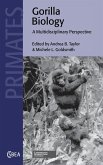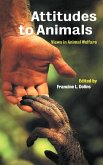Agustín Fuentes / D. Wolfe (eds.)
Primates Face to Face
Herausgeber: Fuentes, Agustín; Wolfe, Linda D.
Agustín Fuentes / D. Wolfe (eds.)
Primates Face to Face
Herausgeber: Fuentes, Agustín; Wolfe, Linda D.
- Gebundenes Buch
- Merkliste
- Auf die Merkliste
- Bewerten Bewerten
- Teilen
- Produkt teilen
- Produkterinnerung
- Produkterinnerung
This book examines the relationships between humans and other primates and the implications for primate conservation.
Andere Kunden interessierten sich auch für
![Gorilla Biology Gorilla Biology]() B. Taylor / L. Goldsmith (eds.)Gorilla Biology196,99 €
B. Taylor / L. Goldsmith (eds.)Gorilla Biology196,99 €![This Side Up This Side Up]() Robert WallThis Side Up222,99 €
Robert WallThis Side Up222,99 €![Shaping Primate Evolution Shaping Primate Evolution]() Fred Anapol / Rebecca Z. German / Nina G. Jablonski (eds.)Shaping Primate Evolution187,99 €
Fred Anapol / Rebecca Z. German / Nina G. Jablonski (eds.)Shaping Primate Evolution187,99 €![The Ecology of Freshwater Molluscs The Ecology of Freshwater Molluscs]() Robert T. DillonThe Ecology of Freshwater Molluscs164,99 €
Robert T. DillonThe Ecology of Freshwater Molluscs164,99 €![Attitudes to Animals Attitudes to Animals]() L. Dolins (ed.)Attitudes to Animals136,99 €
L. Dolins (ed.)Attitudes to Animals136,99 €![Acid Toxicity and Aquatic Animals Acid Toxicity and Aquatic Animals]() R. Morris / E. W. Taylor / D. J. A. Brown / J. A. Brown (eds.)Acid Toxicity and Aquatic Animals163,99 €
R. Morris / E. W. Taylor / D. J. A. Brown / J. A. Brown (eds.)Acid Toxicity and Aquatic Animals163,99 €![A Practical Guide to Vertebrate Mechanics A Practical Guide to Vertebrate Mechanics]() Christopher McgowanA Practical Guide to Vertebrate Mechanics160,99 €
Christopher McgowanA Practical Guide to Vertebrate Mechanics160,99 €-
-
-
This book examines the relationships between humans and other primates and the implications for primate conservation.
Hinweis: Dieser Artikel kann nur an eine deutsche Lieferadresse ausgeliefert werden.
Hinweis: Dieser Artikel kann nur an eine deutsche Lieferadresse ausgeliefert werden.
Produktdetails
- Produktdetails
- Verlag: Cambridge University Press
- Seitenzahl: 360
- Erscheinungstermin: 19. Dezember 2014
- Englisch
- Abmessung: 235mm x 157mm x 26mm
- Gewicht: 735g
- ISBN-13: 9780521791090
- ISBN-10: 052179109X
- Artikelnr.: 26935903
- Herstellerkennzeichnung
- Libri GmbH
- Europaallee 1
- 36244 Bad Hersfeld
- gpsr@libri.de
- Verlag: Cambridge University Press
- Seitenzahl: 360
- Erscheinungstermin: 19. Dezember 2014
- Englisch
- Abmessung: 235mm x 157mm x 26mm
- Gewicht: 735g
- ISBN-13: 9780521791090
- ISBN-10: 052179109X
- Artikelnr.: 26935903
- Herstellerkennzeichnung
- Libri GmbH
- Europaallee 1
- 36244 Bad Hersfeld
- gpsr@libri.de
AGUSTÍN FUENTES is Professor of Anthropology and Director of the Primate Behaviour and Ecology Program at Central Washington University. His research interests include primate behavioural ecology, the evolution of social organization and conservation theory and practice.
Foreword Karen Strier; Introduction Agustin Fuentes and Linda D. Wolfe;
Part I. Science and Nonhuman Primates: 1. Anthropology and Primatology
Phyllis Dolhinow; 2. Resistance to the cross-species perspective in
anthropology Mary M. Pavelka; 3. The ethics and efficacy of biomedical
research in Chimpanzees with special regard to HIV research Roger S. Fouts,
Deborah H. Fouts and Gabriel S. Waters; Part II. Cultural Views of Nonhuman
Primates: 4. Introduction to section Agustin Fuentes and Linda D. Wolfe; 5.
Monkey as food, monkey as child: Guaja symbolic cannibalism Loretta A.
Cormier; 6. Ethnoecology of monkeys among the Bari of Venezuela:
perception, use and conservation Manuel Lizzaralde; 7. Primates in
Matsigenka subsistence and world view Glenn Shepard; 8. Monkey King in
China: basis for a conservation policy Frances Burton; 9. Local population,
conservation efforts and the mountain gorillas of Rwanda Pascale Sicotte
and Prosper Uwengeri; Part III. Conservation of Nonhuman Primates: 10.
Introduction to section Agustin Fuentes and Linda Wolfe; 11. Monkeys,
humans and politics in the Mentawai Islands: no simple solutions in a
complex world Augustin Fuentes; 12. Conservation must pursue a human-nature
biosynergy in the era of social chaos and bushmeat commerce Anthony L.
Rose; 13. A cultural primatological study of Macaca fascicularis on Ngeaur
Island, Republic of Palau Bruce Wheatley, Rebecca Stephenson, Hiro
Kurashina and Kelly Kautz; 14. Monkeys in the back yard: encroaching
wildlife and rural communities in Japan David Sprague; Part IV. Local
Economics: Goverment Actions and Nonhuman Primates: 15. Introduction to
section Agustin Fuentes and Linda Wolfe; 16. The primatologist as minority
advocate Ardith Eudey; 17. Monkey Business? The conservation implications
of macaque ethnoprimatology in southern Thailand Lesley E. Sponsel, Nukul
Ruttanadakul and Poranee Natadecha-Sponsel; 18. Rhesus macaques: a
comparative study of two sites, Jaipur, India and Silver Springs, Florida
Linda Wolfe.
Part I. Science and Nonhuman Primates: 1. Anthropology and Primatology
Phyllis Dolhinow; 2. Resistance to the cross-species perspective in
anthropology Mary M. Pavelka; 3. The ethics and efficacy of biomedical
research in Chimpanzees with special regard to HIV research Roger S. Fouts,
Deborah H. Fouts and Gabriel S. Waters; Part II. Cultural Views of Nonhuman
Primates: 4. Introduction to section Agustin Fuentes and Linda D. Wolfe; 5.
Monkey as food, monkey as child: Guaja symbolic cannibalism Loretta A.
Cormier; 6. Ethnoecology of monkeys among the Bari of Venezuela:
perception, use and conservation Manuel Lizzaralde; 7. Primates in
Matsigenka subsistence and world view Glenn Shepard; 8. Monkey King in
China: basis for a conservation policy Frances Burton; 9. Local population,
conservation efforts and the mountain gorillas of Rwanda Pascale Sicotte
and Prosper Uwengeri; Part III. Conservation of Nonhuman Primates: 10.
Introduction to section Agustin Fuentes and Linda Wolfe; 11. Monkeys,
humans and politics in the Mentawai Islands: no simple solutions in a
complex world Augustin Fuentes; 12. Conservation must pursue a human-nature
biosynergy in the era of social chaos and bushmeat commerce Anthony L.
Rose; 13. A cultural primatological study of Macaca fascicularis on Ngeaur
Island, Republic of Palau Bruce Wheatley, Rebecca Stephenson, Hiro
Kurashina and Kelly Kautz; 14. Monkeys in the back yard: encroaching
wildlife and rural communities in Japan David Sprague; Part IV. Local
Economics: Goverment Actions and Nonhuman Primates: 15. Introduction to
section Agustin Fuentes and Linda Wolfe; 16. The primatologist as minority
advocate Ardith Eudey; 17. Monkey Business? The conservation implications
of macaque ethnoprimatology in southern Thailand Lesley E. Sponsel, Nukul
Ruttanadakul and Poranee Natadecha-Sponsel; 18. Rhesus macaques: a
comparative study of two sites, Jaipur, India and Silver Springs, Florida
Linda Wolfe.
Foreword Karen Strier; Introduction Agustin Fuentes and Linda D. Wolfe;
Part I. Science and Nonhuman Primates: 1. Anthropology and Primatology
Phyllis Dolhinow; 2. Resistance to the cross-species perspective in
anthropology Mary M. Pavelka; 3. The ethics and efficacy of biomedical
research in Chimpanzees with special regard to HIV research Roger S. Fouts,
Deborah H. Fouts and Gabriel S. Waters; Part II. Cultural Views of Nonhuman
Primates: 4. Introduction to section Agustin Fuentes and Linda D. Wolfe; 5.
Monkey as food, monkey as child: Guaja symbolic cannibalism Loretta A.
Cormier; 6. Ethnoecology of monkeys among the Bari of Venezuela:
perception, use and conservation Manuel Lizzaralde; 7. Primates in
Matsigenka subsistence and world view Glenn Shepard; 8. Monkey King in
China: basis for a conservation policy Frances Burton; 9. Local population,
conservation efforts and the mountain gorillas of Rwanda Pascale Sicotte
and Prosper Uwengeri; Part III. Conservation of Nonhuman Primates: 10.
Introduction to section Agustin Fuentes and Linda Wolfe; 11. Monkeys,
humans and politics in the Mentawai Islands: no simple solutions in a
complex world Augustin Fuentes; 12. Conservation must pursue a human-nature
biosynergy in the era of social chaos and bushmeat commerce Anthony L.
Rose; 13. A cultural primatological study of Macaca fascicularis on Ngeaur
Island, Republic of Palau Bruce Wheatley, Rebecca Stephenson, Hiro
Kurashina and Kelly Kautz; 14. Monkeys in the back yard: encroaching
wildlife and rural communities in Japan David Sprague; Part IV. Local
Economics: Goverment Actions and Nonhuman Primates: 15. Introduction to
section Agustin Fuentes and Linda Wolfe; 16. The primatologist as minority
advocate Ardith Eudey; 17. Monkey Business? The conservation implications
of macaque ethnoprimatology in southern Thailand Lesley E. Sponsel, Nukul
Ruttanadakul and Poranee Natadecha-Sponsel; 18. Rhesus macaques: a
comparative study of two sites, Jaipur, India and Silver Springs, Florida
Linda Wolfe.
Part I. Science and Nonhuman Primates: 1. Anthropology and Primatology
Phyllis Dolhinow; 2. Resistance to the cross-species perspective in
anthropology Mary M. Pavelka; 3. The ethics and efficacy of biomedical
research in Chimpanzees with special regard to HIV research Roger S. Fouts,
Deborah H. Fouts and Gabriel S. Waters; Part II. Cultural Views of Nonhuman
Primates: 4. Introduction to section Agustin Fuentes and Linda D. Wolfe; 5.
Monkey as food, monkey as child: Guaja symbolic cannibalism Loretta A.
Cormier; 6. Ethnoecology of monkeys among the Bari of Venezuela:
perception, use and conservation Manuel Lizzaralde; 7. Primates in
Matsigenka subsistence and world view Glenn Shepard; 8. Monkey King in
China: basis for a conservation policy Frances Burton; 9. Local population,
conservation efforts and the mountain gorillas of Rwanda Pascale Sicotte
and Prosper Uwengeri; Part III. Conservation of Nonhuman Primates: 10.
Introduction to section Agustin Fuentes and Linda Wolfe; 11. Monkeys,
humans and politics in the Mentawai Islands: no simple solutions in a
complex world Augustin Fuentes; 12. Conservation must pursue a human-nature
biosynergy in the era of social chaos and bushmeat commerce Anthony L.
Rose; 13. A cultural primatological study of Macaca fascicularis on Ngeaur
Island, Republic of Palau Bruce Wheatley, Rebecca Stephenson, Hiro
Kurashina and Kelly Kautz; 14. Monkeys in the back yard: encroaching
wildlife and rural communities in Japan David Sprague; Part IV. Local
Economics: Goverment Actions and Nonhuman Primates: 15. Introduction to
section Agustin Fuentes and Linda Wolfe; 16. The primatologist as minority
advocate Ardith Eudey; 17. Monkey Business? The conservation implications
of macaque ethnoprimatology in southern Thailand Lesley E. Sponsel, Nukul
Ruttanadakul and Poranee Natadecha-Sponsel; 18. Rhesus macaques: a
comparative study of two sites, Jaipur, India and Silver Springs, Florida
Linda Wolfe.








